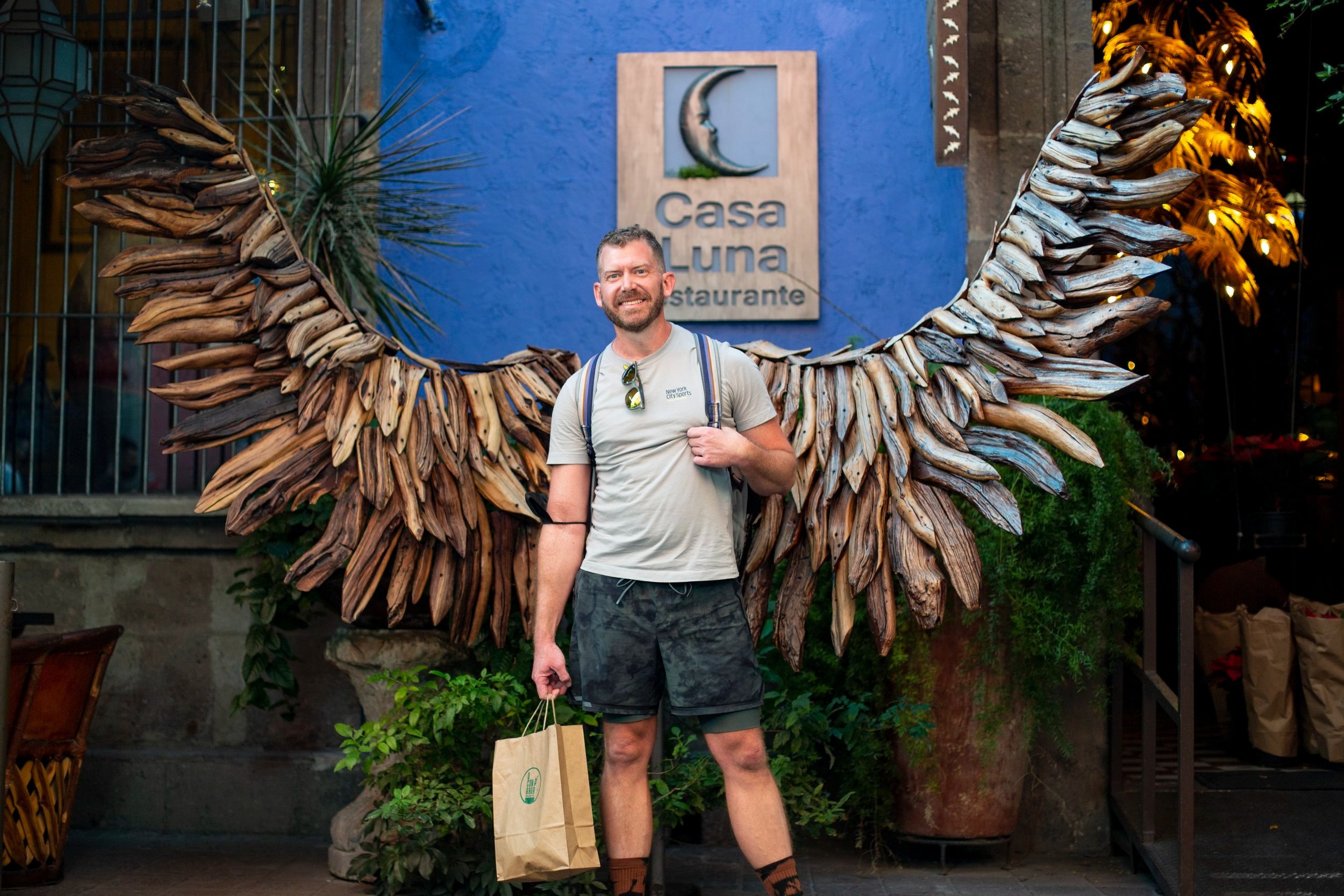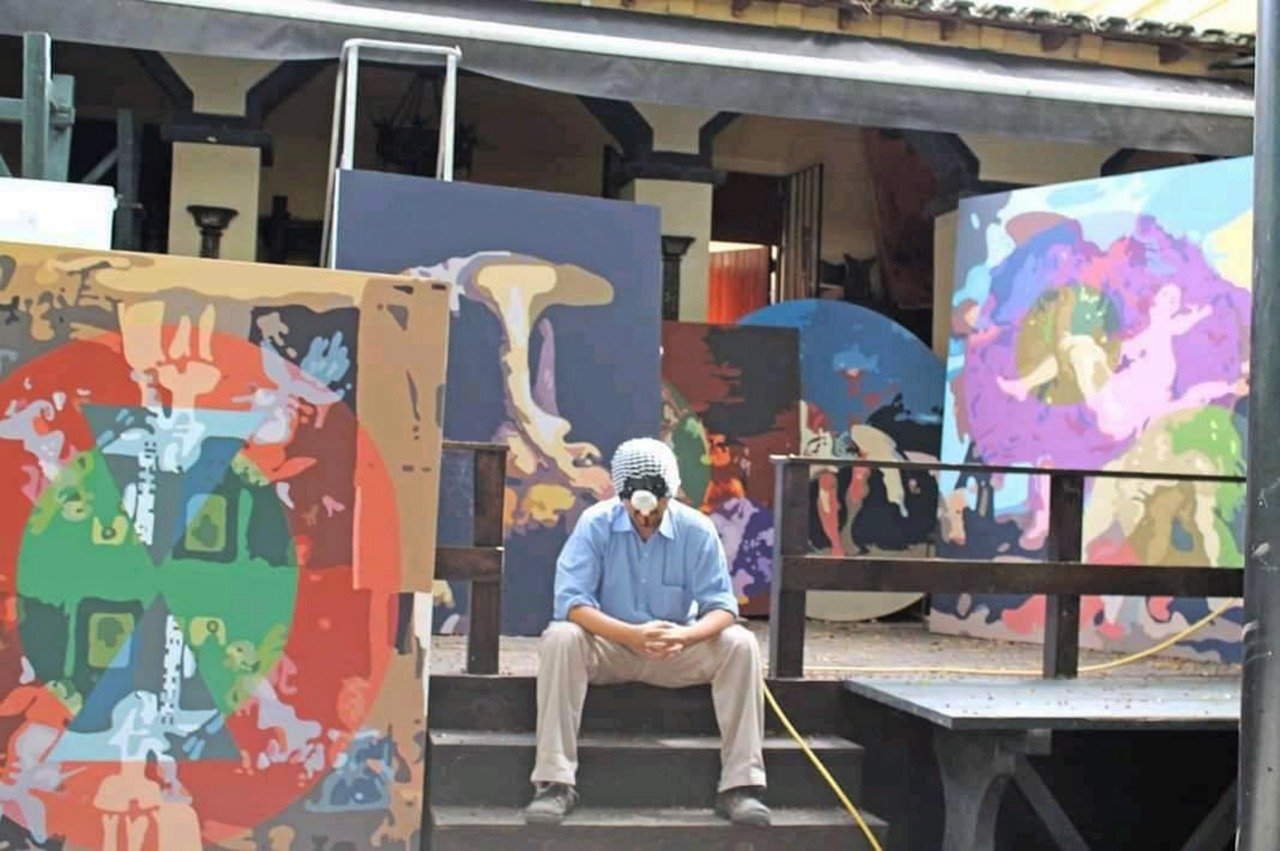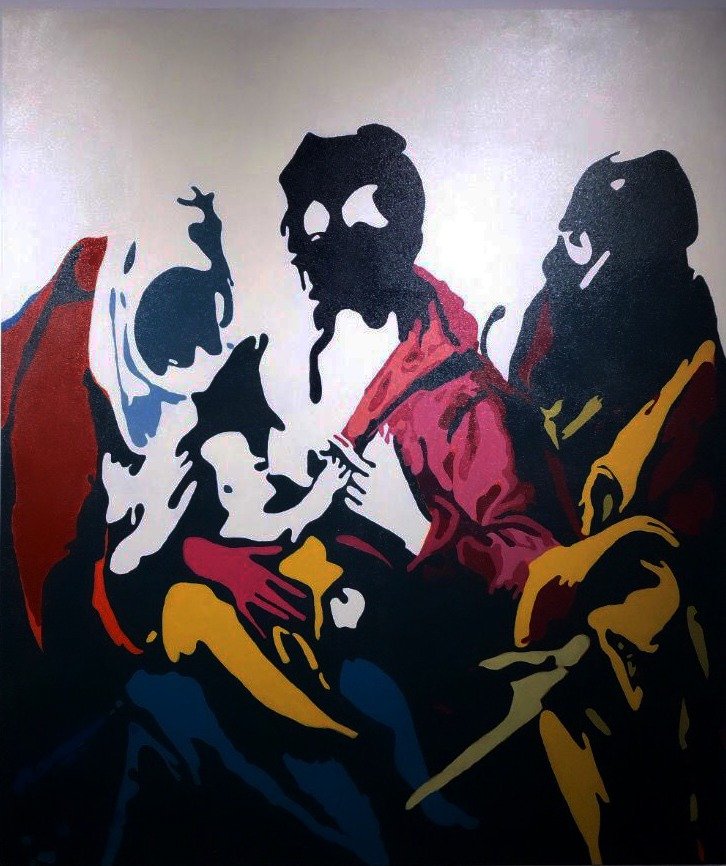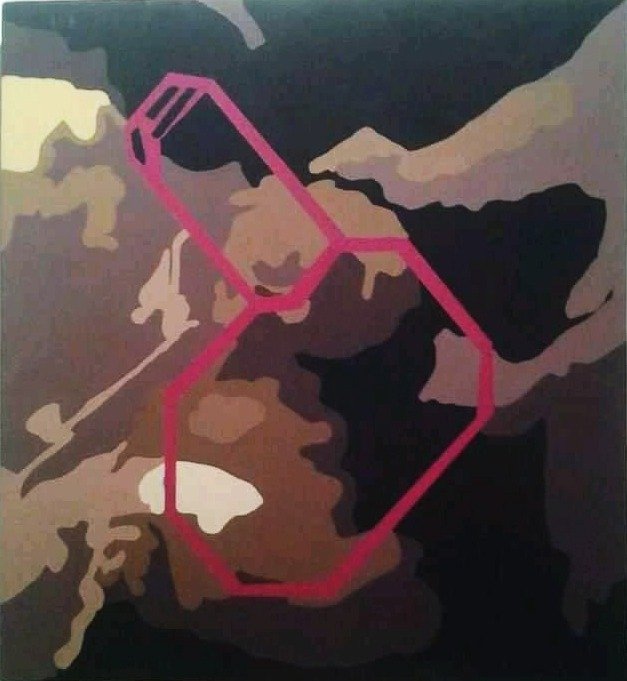One thing I love about living in Guadalajara is all of the outstanding artists that live and work in this unbelievably creative city. Many seem so accessible to meeting me in person. I first contacted Pablo H. Cobian through social media after purchasing an insane cuadra from Tianguis de Antigüedades La Avenida México. When I first moved back to Guadalajara while walking home from a COVID test to travel, I stumbled upon first the plant market every Saturday then the antique and flea market held every Sunday.
From the first Sunday I found the tianguis, I was hooked. Not only with all the crystals, artwork, and crap that was being sold but also with the connections and friendships I made during a time of intense healing and recovery from surgery to repair my broken jaw. This is where I practiced my Spanish the most and covered my walls with amazing Mexican art.
Living in Guadalajara is like finding yourself immersed in a living, breathing canvas. This vibrant city, rich in culture and history, has been an inspiring playground for many artists. Among the many creative minds residing here, Pablo H. Cobian stands out as a name that encapsulates the spirit and soul of this city. His unique approach to art has gained him recognition, not only locally but also internationally.
Born and raised in Guadalajara, Pablo H. Cobian was heavily influenced by the city's dynamism and cultural diversity. His artistic journey began from a young age, inspired by stories his grandmother would narrate to him, which he would then translate into sketches. He showed a natural talent for capturing the essence of these tales through his drawings, a skill that would later define his unique artistic style.
Pablo's interest in arts was also encouraged by his family and his high school teacher Ansaldo Gutiérrez, who recognized his talent and encouraged him to pursue his passion. This led Pablo to study at the School of Plastic Arts at the University of Guadalajara, where he honed his skills and developed his distinct approach to painting and visual arts.
His artistic journey has been marked by experimentation across different mediums such as video, installation, and performance. However, painting remained his primary form of expression. His love for painting is organic and deeply rooted in his desire to explore the possibilities of images, particularly the deformation of images in the digital age.
One of the unique characteristics of his work is the intricate blend of abstract and figurative elements. His art often revolves around reinterpreting existing images, transforming their formal values like composition, color, and light into an aesthetic that oscillates between abstraction and figuration.
Pablo's interest in popular culture is also evident in his work. His ongoing project, "Little Museum of Stuff," involves creating a collection of popular culture objects he has handpicked, ranging from cameras, electronic devices, toys, to a myriad of other items. This love for ordinary objects and their potential transformation is a clear reflection of the lively atmosphere and the vibrant culture of Guadalajara that he holds close to his heart.
Connecting with Pablo H. Cobian is not only an experience of appreciating his outstanding art but also a journey into understanding the beating heart of Guadalajara. His art is a portal into the city's soul, a reflection of its culture, and a celebration of its vibrant spirit. Just as Guadalajara has nurtured his artistic journey, his art, in return, continues to add to the rich tapestry of the city's cultural life.
Interview with Pablo Cobian (GPT-4 translated to English)
The reason I paint is organic. I trained as a painter at the University of Guadalajara, at the School of Plastic Arts, with a degree in Visual Arts with a focus on painting; that was my training. I've always been drawn to all forms of art - video, installation, performance, etc. that I see in books and museums. Although I also work in these other mediums, painting has always been a form of escape, a way to explore the possibilities of the image. I'm very interested in the deformations that an image can have, based on certain aspects or characteristics of digital images. How the image is deformed, most of the sketches and works I do on images that I vectorize, that I transform into color blobs. I usually work on themes related to the history of art, of painting, studying images that already existed, taking their formal values - composition, color, light - and transforming them into blobs.
Defining what is art is very complex because while it is a form of expression that has transformed cultures, it is also a human interest to communicate not necessarily practical things, sometimes, perhaps things like the connection with the spiritual and connections to science - aspects or activities that are sought as a possibility to observe those small things that are constantly transforming the world and that are sometimes imperceptible. In the same way, I believe that art is a form of action, a way to transform our immediate reality.
When I was a little boy, my grandmother was the one who took care of me. My mother worked, so did my aunt, so my grandmother looked after me most of the time. She would tell me a story and then I had to make a drawing from it. As I grew up, the dynamics was that I would read her a story and make a drawing. Let's say that's where my interest began. As a teenager, I attended painting classes, but I was initially interested in studying literature or philosophy. I had a high school teacher named Ansaldo Gutiérrez and he suggested, "Why don't you study art?" So, that's how I got to know the School of Arts. I loved going to exhibitions, buying painting books, and so, let's say, that's how I got started in this.
I believe that style has a lot to do with how we recognize the world and how we recognize ourselves as part of the world - a series of things that we are building, and for example in my case, I do drawing, installation, video and I think that the medium depends a lot on the aspects that interest me about my reality. In the case of painting, as I said before, I am very interested in planes, exploring formal values such as atmospheric light, composition, color. These are elements that I like about the image and bringing them, let's say, to a solution that fluctuates a bit between the abstract and the figurative. Let's say like an image that is fading and deforming until it remains more like a blob of colors, and I think I could define a bit the visual or aesthetic values of my work through that.
Right now, I am specifically working on a series of paintings. I have a project called Little Museum of Stuff, it is a collection of objects from popular culture that I am selecting and storing, ranging from cameras, electronic devices, toys, a lot of things. Right now I am working on selecting animals, especially anthropomorphic animals, or whose representation is anthropomorphic, to create a kind of bestiary. And I am working on a series of paintings that represent these animal figures that appear in cartoons, childhood TV shows, these fantastic animals, and therefore it is like a cataloging of a contemporary bestiary.
Original interview answers in Spanish
Written by Pablo H. Cobian to Renata for Forrest Glover Design
La razón por la que pinto es orgánica, yo me forme como pintor en la universidad de Guadalajara en la escuela de artes plásticas en la licenciatura de artes visuales con orientación en pintura esa fue mi formación; siempre por cosas que veía en libros en museos me ha llamado la atención todas las formas de arte el video la instalación el performance etcétera Y aunque también trabajo en estos otros soportes la pintura siempre ha sido una forma de escape, una forma de explorar las posibilidades de la imagen me interesa mucho de repente las deformaciones que tiene la imagen a partir de ciertos aspectos o características de la imagen digital Cómo se deforma la imagen la mayoría de los bocetos los trabajos en imágenes que voy vectorizando que voy trans formando aplastas de colores normalmente trabajo temas que tienen que ver con la historia del arte de la pintura con temas con el estudiar imágenes que ya existieron tomar sus valores formales composición color luz y transformarlos en y plastas
Definir Qué es arte, es algo muy complejo, porque si bien es una forma de expresión, qué ha transformado las culturas, también es una forma o un interés del ser humano por comunicar no necesariamente cosas de manera práctica, a veces, tal vez cosas como la conexión con lo espiritual y conexiones a la ciencia aspectos o actividades que se buscan como posibilidad de observar esas cosas pequeñas que van transformando constantemente al mundo y que a veces son imperceptibles, de la misma manera creo en el arte es una forma de acción, una manera de transformar nuestra realidad inmediata.
De chiquito mi abuela era quién me cuidaba, mi mamá trabajaba, mi tía también, me cuidaba la mayor parte del tiempo, mi abuela, entonces ella realizaba una dinámica, me contaba un cuento y después yo tenía que hacer un dibujo a partir de este, ya cuando empecé a crecer la dinámica era yo leerle a ella una historia igual hacer un dibujo, digamos que ahí comienza un poco mi interés, después adolescente asistí a clases de pintura, sin embargo, en un principio me interesaba estudiar literatura o filosofía, yo tenía un profesor en la preparatoria que se llama Ansaldo Gutiérrez y él mencionó Por qué no estudias artes, pues así fue como conocí la escuela de artes, me gustaba mucho ver exposiciones, comprar libros de pintura y entonces, vamos que así es cómo me inició en esto.
Yo creo que el estilo tiene mucho que ver con más bien la forma en qué reconocemos el mundo y en qué nos reconocemos como parte del mundo una serie de cosas que vamos construyendo y que por ejemplo en mi caso hago dibujo, instalación, video y creo que el soporte depende mucho de los aspectos que me interesan de mi realidad, en el caso de la pintura y como ya dije antes me interesa mucho como los planos, explorar los valores formales como atmosféricos de luz composición color esas son como elementos que me gusta de la imagen y llevarlos Digamos como a una solución que fluctúa un poco como entre lo abstracto y lo figurativo decir como una imagen que se va desvaneciendo y se va deformando hasta quedar más como una plasta de colores y creo que por ahí podría definir un poco los valores visuales o estéticos de mi trabajo.
Pues por ahora justo estoy trabajando en una serie de pinturas específicamente. Tengo un proyecto que se llama pequeño museo de chingaderas, es una colección de objetos de la cultura popular que voy seleccionando y que voy guardando, va desde cámaras, aparatos electrónicos, juguetes, un montón de cosas Ahorita estoy trabajando en seleccionar animales, sobre todo animales antropomórficos o que su representación es antropomórfica para crear una especie de bestiario. Y estoy trabajando en una serie de pinturas que representan estas figuras de animales que aparecen en las caricaturas, los programas de televisión de la infancia, estos animales que son fantásticos y que, por lo tanto, es como una catalogación de un bestiario contemporáneo








